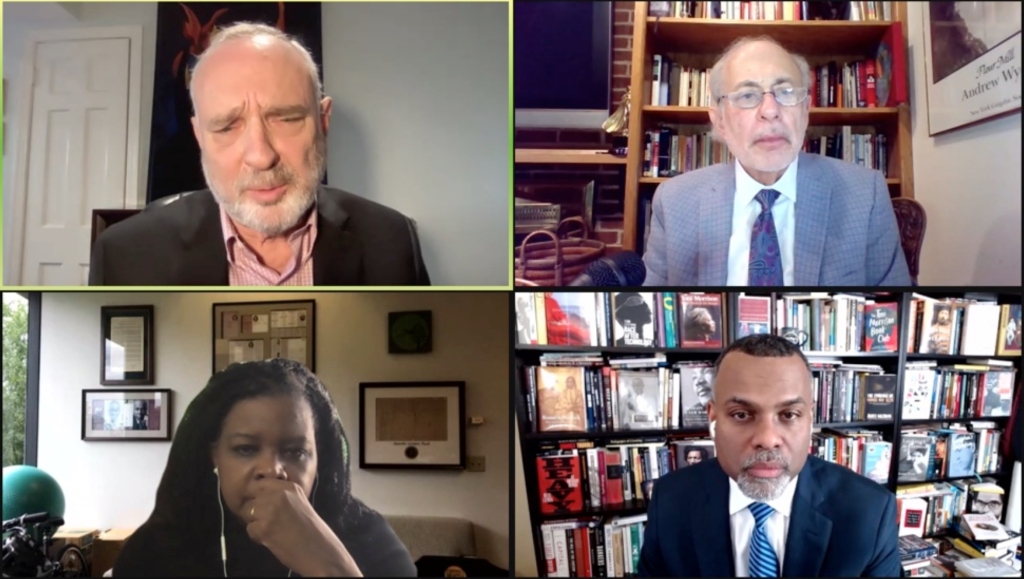
Rabbi David Saperstein thinks the deaths of African Americans due to COVID-19 and police brutality in 2020 acted like a shofar blast to the nation.
“We are at a moment, in terms of race issues in America, where there is a sense of immediacy, a sense of urgency, a sense of moral compulsion, that we have accepted structural forms of racism for far too long,” he said. “And it’s been a wake-up call.”
The director emeritus of the Religious Action Center of Reform Judaism spoke about racial justice on Feb. 24 during “Global Connections: Navigating the New Abnormal,” a monthly leadership panel organized by American Friends of Rabin Medical Center. Robert Siegel, host of NPR’s “All Things Considered” from 1987 to 2018, served as moderator.
For this month’s topic, “America’s Race Crisis: What to Do About It,” Siegel asked his guests about concrete actions Americans could take to heal the harm caused by systemic racism and white supremacy.
Professor Eddie Glaude, chair of the department of African American Studies at Princeton University, responded with questions of his own.
“What is your conception of justice? What is your idea of a just society?” he asked.
He argued that true equality would only be possible if those in positions of power moved away from a model of racial justice as a philanthropic enterprise or charitable gesture and toward a reimagining of society. Siegel pressed him for examples.
“It could involve a range of actions around criminal justice reform and police reform, supporting the repeal of qualified immunity,” he said. “What I think we need broadly, Robert, is a public infrastructure of care, but that’s a discussion for another time.”
Annette Gordon-Reed, a professor of history at Harvard University and a Pulitzer Prize winner, said white people who wanted to fight racism could support people of color by engaging in conversations about race and inequality with their loved ones.
“It’s a very tough thing to confront family members and friends, people who you love and who you depend upon, when they say things or do things that are racially problematic,” she said.
She said that although it’s not an easy task, the conversations are critical, since people are more likely to take these ideas seriously if they come from those they already know and trust.
Saperstein, who is the former United States Ambassador-at-Large for International Religious Freedom, said fighting against gerrymandering and other threats to the Voting Rights Act of 1965 was a crucial step in achieving true equality. He invoked Genesis as a repudiation of racism.
“A whole range of interpretations of the Bible asked, ‘Why would we all be descended from one couple? Why was Adam made from the dust of the four corners of the earth?’ So that none of us can claim that the merit of our ancestors was greater than anyone else’s,” he said.
He expressed concern about the breakdown of bipartisanship in the United States and the threat it posed to the racial justice movement, calling it one of the most dangerous aspects of American political life.
“As you look back, Robert, over the last century, in the 20th century, almost every single achievement of social justice in America happened because of a bipartisan coalition of decency on Capitol Hill, and multiracial, multi-ethnic, multireligious, nonpartisan coalitions in communities across America,” he said.
Siegel also asked the panelists if they believed universal social programs to combat economic inequality, such as public health care, or targeted programs based on the injustices experienced by individual minority groups would be more effective in creating change.
Glaude advocated for a targeted approach in response to the fact that racial inequality was the result of policies that specifically targeted people of color for exclusion and harm. One example was the exclusion of Black people from G.I. Bill benefits that helped build a largely white middle class in the late ’40s and ’50s.
Gordon-Reed argued that both forms of intervention are necessary.
“The advantage of universal [programs] is that you don’t stir people up, and you know everybody gets something, and that’s when you begin the process of knitting the country together, by people sharing something. That’s critical,” she said.
[email protected]; 215-832-0729



